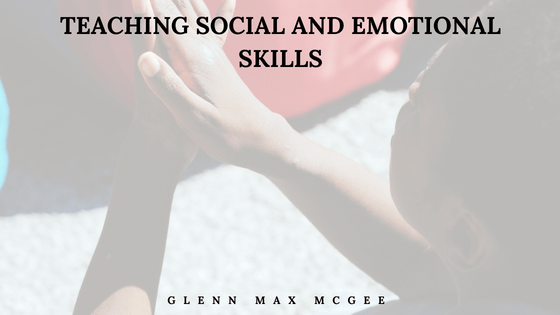John Hattie is quoted as saying “A positive, caring, respectful environment is a prior condition to learning.” Regardless of how busy a teacher is, one cannot underestimate the importance of making the time for creating and cultivating a welcoming, positive classroom environment that fosters students’ healthy social and emotional development. Without this, little authentic learning will occur in the classroom.
What are these skills to develop that are so important and why do they matter? Social and emotional learning centers the student’s mind and body, reduces the emotional tension, and allows the student to be more open to learning. When students sense teachers care about them as individuals, they engage more frequently and deeply, and teachers get their best thinking and effort. If we expect students to be college and career ready – much less, LIFE ready – it is important that teachers and administrators embed social and emotional learning in every class.
Self-awareness Skills
Self-awareness is the ability to identify emotions and tie thoughts and feelings to behaviors. This is one of the most difficult skills for young people to acquire, so this work is incredibly meaningful. What are some ways teachers can teach their students the value of self awareness? Teachers can promote it through affording journaling time, mindful meditation, and connecting to student’s personal lives as much as possible.
Self-management Skills
Self-management skills include the ability to self-motivate, to have self-control and to regulate one’s impulses and emotions. Impulse control is especially challenging for boys through much of their schooling. Giving them opportunities to move during class, actively teaching strategies for self-regulation, connecting personally with them to learn their triggers are going to make a lasting positive difference for them.
Relationship Skills
Relationship skills are imperative to achieving success in life. Relationship skills include the ability to work cooperatively with others, to resolve conflict productively, to empathize, to listen, and to trust. Giving students ample time and multiple opportunities to work with classmates to solve problems – both academic and social – and to create a classroom family feeling are strategies that have proven successful for decades. For example, I still hear from and cherish the memories of the last sixth grade class I taught back in 1980! We were quite the fun family at Fairview School.
Decision Making Skills
Responsible decision-making entails considering the well-being of self and others and evaluating the consequences for one’s own actions. Teachers can use everyday examples in the classroom to model positive decision making skills by sharing their thought processes and consideration of other options.
Teachers are teaching students how to problem solve, how to be resilient and so much more when they address social and emotional skills. While our states continue to emphasize testing, the social and emotional skills we help kids develop will last long after they forgot what was on that standardized test.

